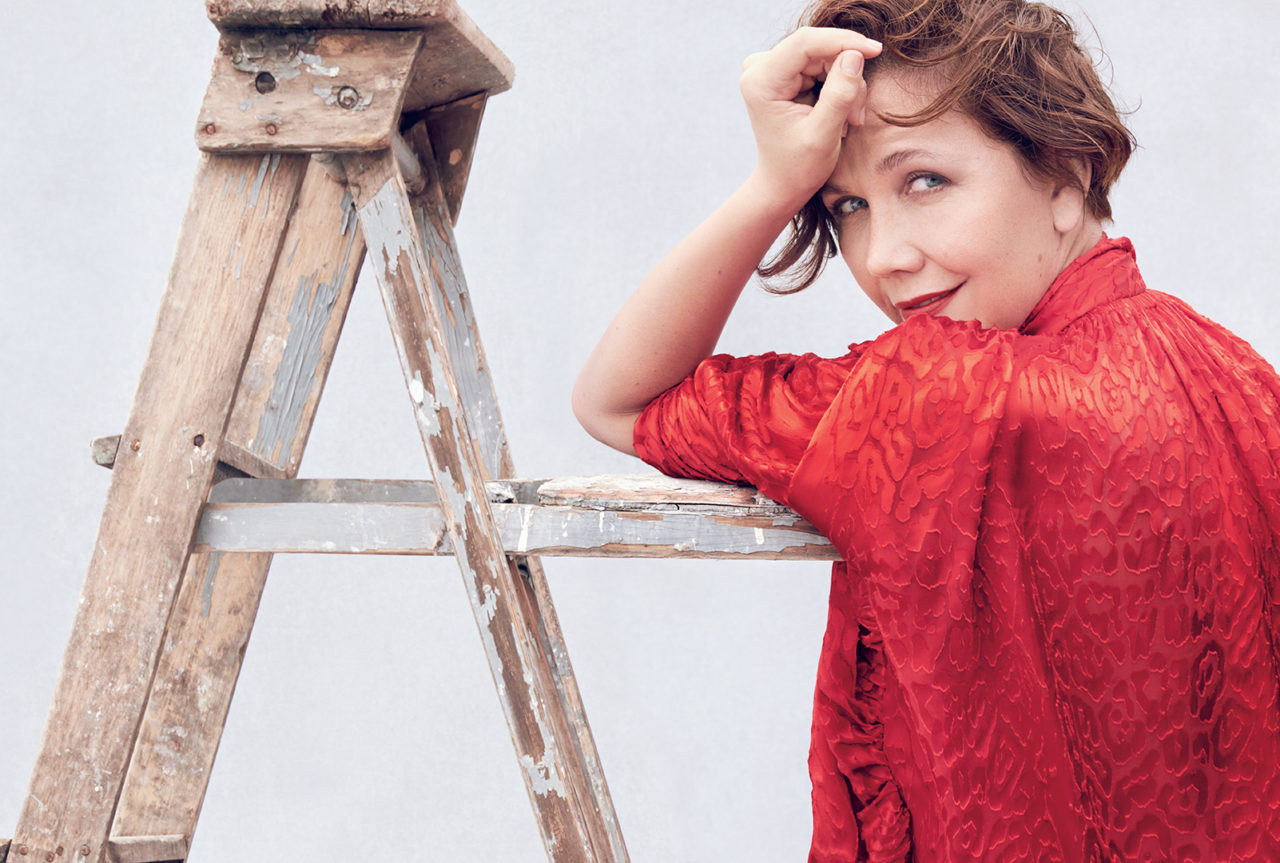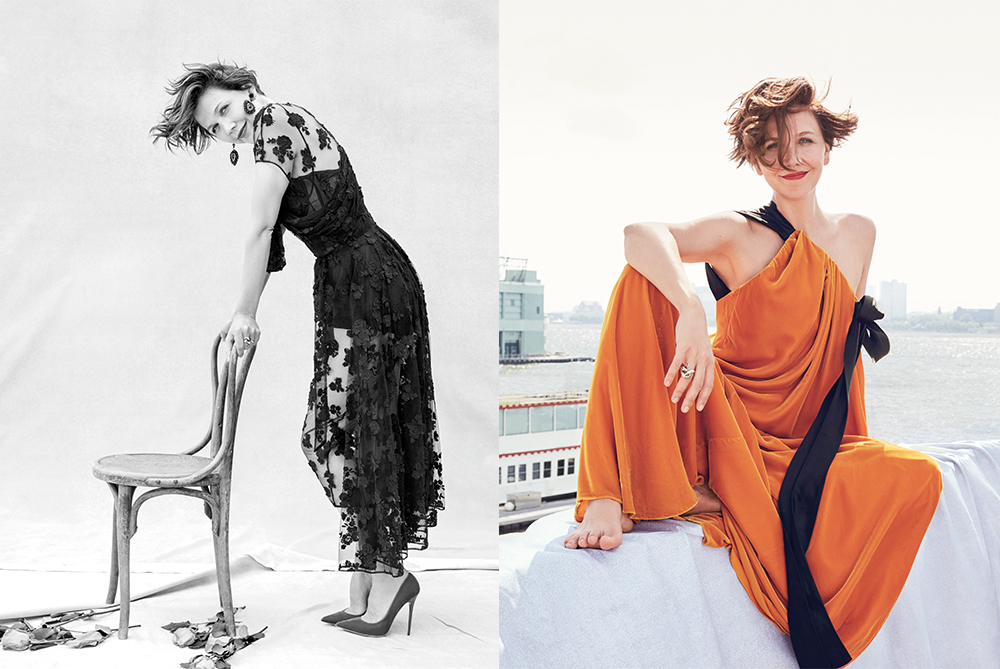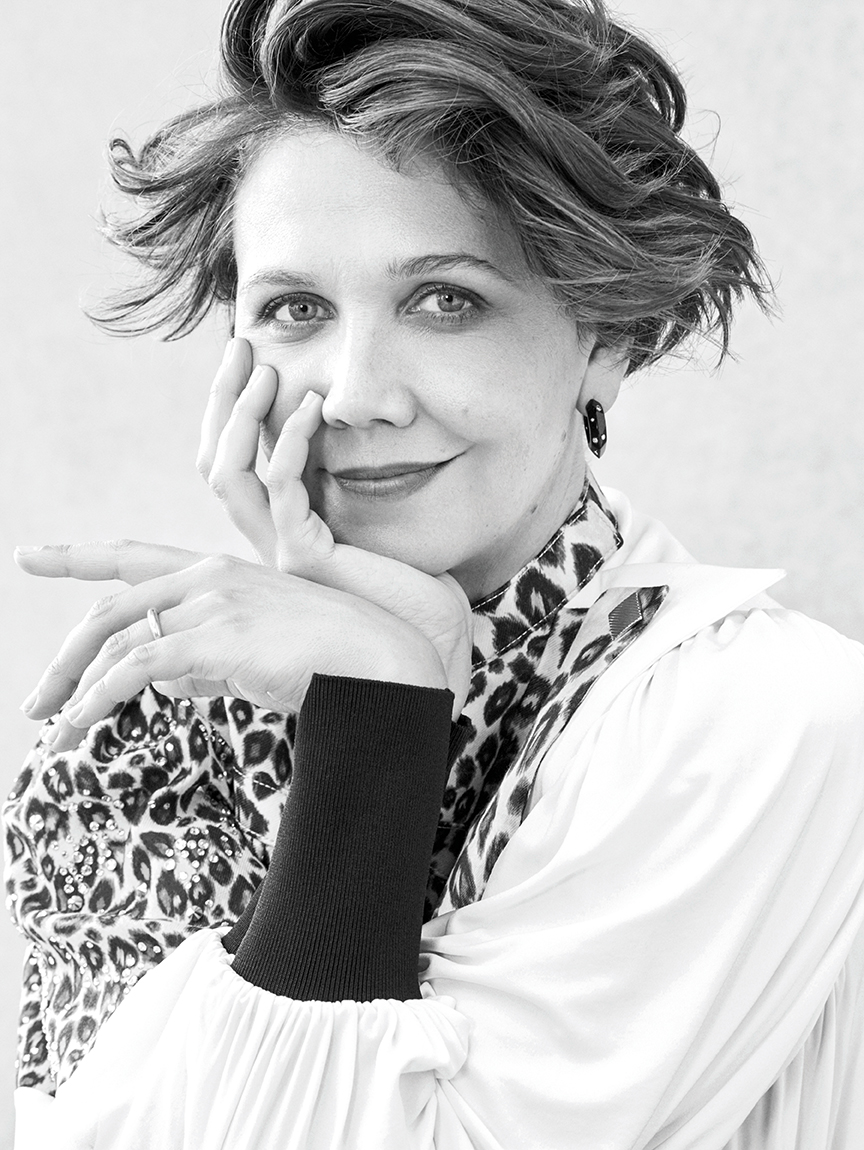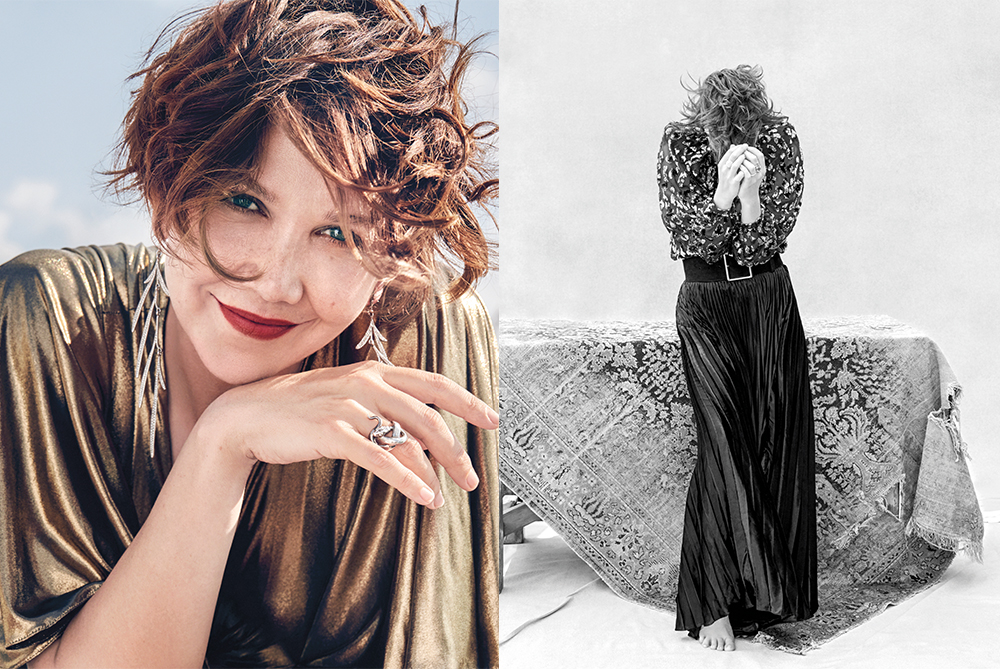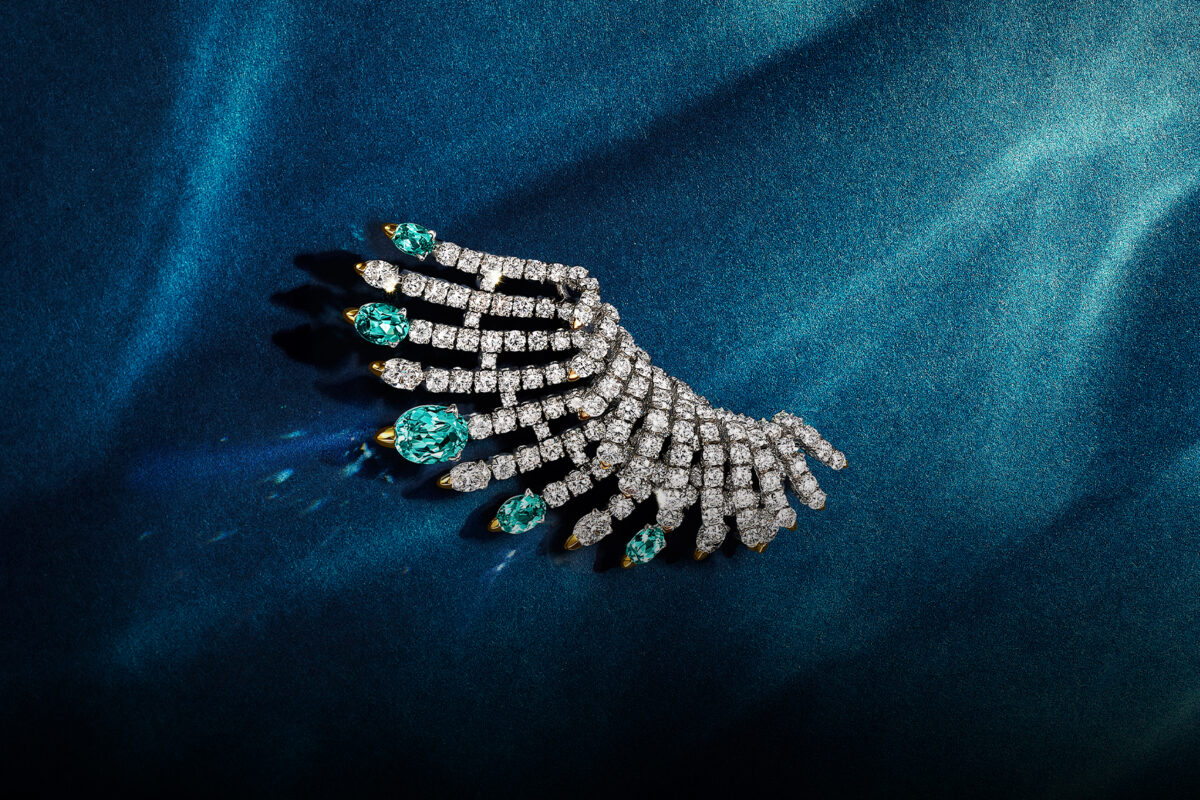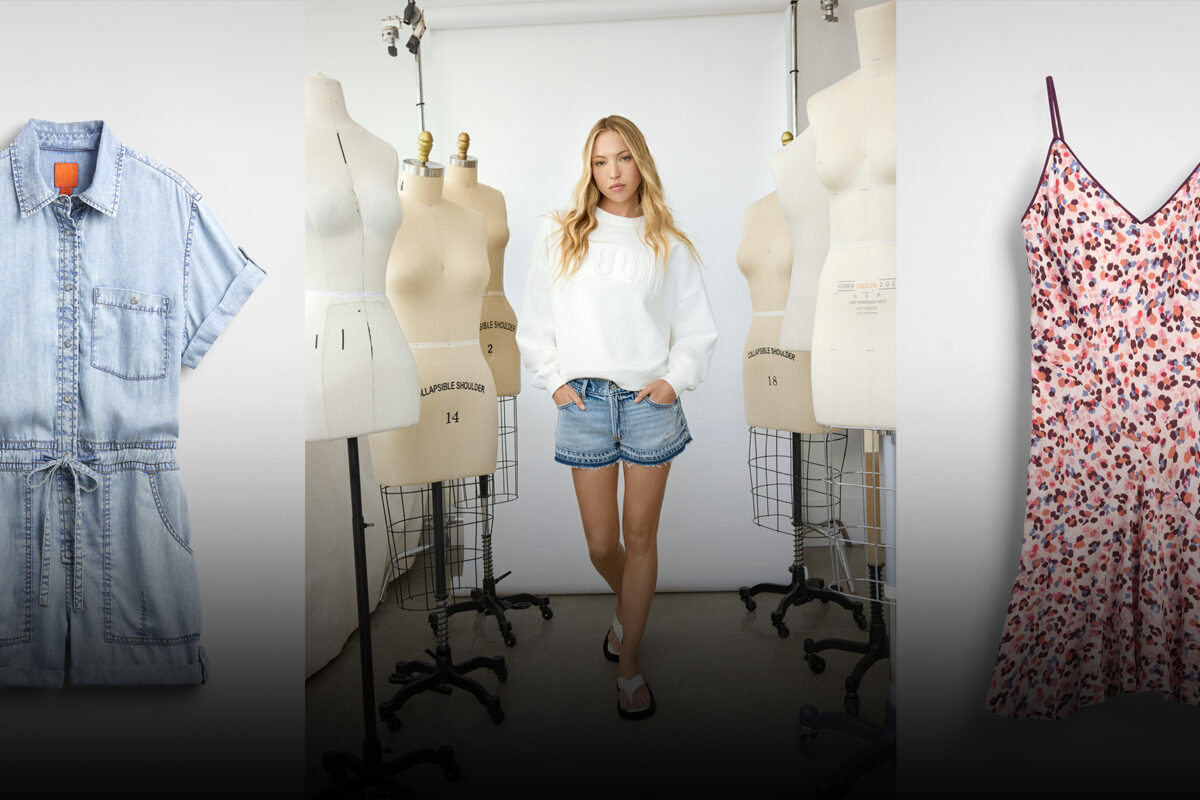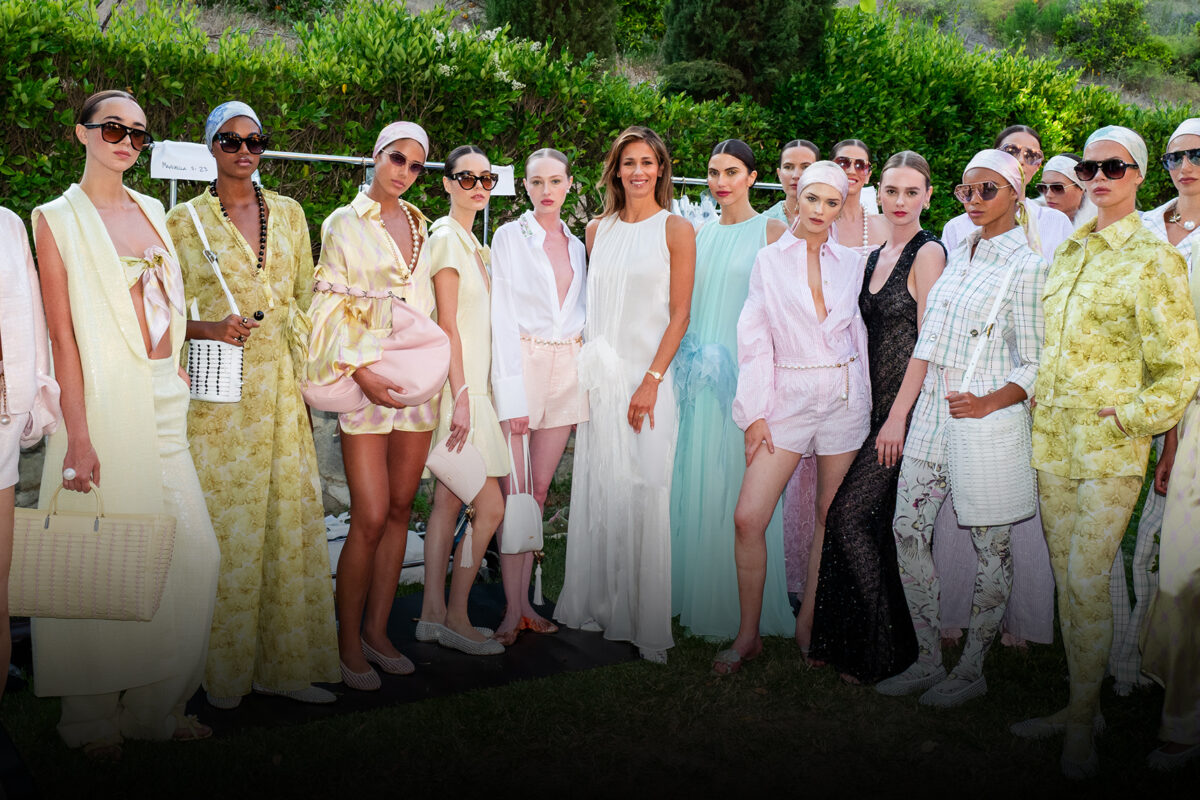A darling of the critics but a critic of the system, the trailblazer and talent plays Hollywood by her own rules
Words by JANE MULKERRINS
Photography by KERRY HALLIHAN
Creative & Fashion Direction by ALISON EDMOND
When Maggie Gyllenhaal was told she was about to receive a significant increase in her salary to equal that of James Franco, her co-star in the HBO drama The Deuce, she had, she admits, “a very unfeminist reaction to it, initially.”
“I felt guilty, as if it somehow wasn’t fair,” she explains. “It felt so incredibly generous and unexpected to be paid the same as my male co-star. Then I realized, ‘Oh, I’ve been brainwashed.’ Even with my own husband [actor Peter Sarsgaard], I’d think, ‘Oh, he’s getting paid that for this part in this movie; that’s not what I’d be paid for that.’” She mock-shrugs, as if to dismiss the discrepancy as the simple order of things. “I really drank the Kool-Aid,” she continues. “Then, quickly, I was very grateful to HBO — not just for the money but for the thinking behind the money.”
As radical as it feels for Hollywood’s leading female actors to now, finally, be receiving some pay parity, it’s particularly surprising to hear admissions of an apparent form of financial Stockholm Syndrome from one of the industry’s otherwise most outspoken voices.
Gyllenhaal, the 41-year-old star of such indie hits as Secretary, Sherrybaby and, more recently, The Kindergarten Teacher, has a tendency to speak up when others have remained silent: in opposition to the Iraq War, for example, and even in openly expressing disillusionment with Barack Obama. She has become a prominent figure in the Time’s Up movement. “Somebody said to me recently that they were upset that they could no longer compliment a woman on set and tell her how beautiful she looked,” she tells me, with an extravagant roll of her big, round blue eyes. “What a willful misunderstanding of what we intelligent women are after. But people get angry when they have to change.”
“I’m not anti-porn. But there is a human cost to the rampant capitalist business element of it”
It’s late morning in the courtyard of a genteel hotel in downtown Manhattan, where Gyllenhaal is currently living while between houses; she and Sarsgaard, having sold their four-story townhouse in Park Slope, Brooklyn, are awaiting the renovation of their new home, also in Brooklyn, to be completed. She sweeps into the lobby looking every inch the A-lister, in enormous sunglasses and a floral Roland Mouret dress. “I’m only wearing this because I just did morning TV,” she explains of her before-noon glamour.
We last met exactly two years ago, just as the first season of The Deuce was about to launch and a month or so before the #MeToo movement exploded. It has, she attests, felt like the most extraordinary couple of years. “I do think it was set off by [Donald] Trump being elected and having been caught on tape saying you can grab women’s pussies, and ‘they let you do it if you have power,’ and there being absolutely no consequences,” she says vehemently. “People — women — just went: ‘Oh, really? No f*cking way — we can’t just sit on all this anymore.’”
But Gyllenhaal — thoughtful and literary, quoting Charlotte Brontë, Virginia Woolf and Rachel Cusk in the course of a single breath — is not one for pat answers or the simplistic apportioning of blame. “We’ve made cultural agreements to accept certain things, and now we’re going, ‘Oh, no, actually, I don’t want to agree to this anymore,’” she says. “Without the vote or access to so many jobs, women have been forced to use all the tools in their toolbox — which includes sexuality — to get things they want.” She pauses, lifts the lid of the teapot and peers inside. “How many of us haven’t put on a push-up bra and a blouse to try to get a job? That’s not the same as being a sex worker, but it’s not entirely different,” she posits. The taboo subject is of keen interest to Gyllenhaal, since her character in The Deuce, Candy, has, over the course of the past two seasons, gone from being a prostitute to a director of porn films; the show is currently airing its third season.
While trying to better understand her character, Gyllenhaal says, “I’ve noticed that there’s an acceptable cultural hatred of sex workers and people involved in porn. And I think that what we’re really saying with that is: ‘You hold the part of me that I’m ashamed of and that I wish I hadn’t agreed to.’”
“It’s an amazing thing as an actor to use your body in storytelling”
Charting the rise of the porn industry in New York City, the first season of the series — created by David Simon and George Pelecanos, the pair behind The Wire — took place in 1971, the second in 1977; this third and final season begins in 1985, with the spectre of the AIDS crisis adding an extra layer of public censure and moralizing about sex. “I’m not anti-porn, and I don’t think the show is anti-porn,” says Gyllenhaal. “But there is a human cost to the commodification, the rampant capitalist business element of it.”
A waiter arrives at our table to see if we want to eat. “Is it lunchtime yet?” asks Gyllenhaal. It’s 11:30 a.m. “I’ve been up for so long already,” she says, shrugs and orders a steak.
Given the sex-heavy storylines of the show, for the making of season two, filmed in the early months of the #MeToo movement, HBO appointed an “intimacy coordinator” — the first network to do so.
Again, Gyllenhaal admits her reaction to the hire wasn’t initially positive. She has never shied away from nudity. “I think it’s an amazing thing as an actor to use your body in storytelling,” she says. “My body is definitely in the third season of The Deuce and it looks like the body of a 41-year-old woman, and I think that’s cool.”
She continues, “But I believed I’d been managing nudity and sex scenes just fine for 20 years. And then, in season two, Alicia [Rodis, the HBO intimacy coordinator] came in, and, to be completely honest, there was a part of me that felt: ‘I don’t want you messing with what I’ve got sorted. I’ve got my system.’” She lets out a hollow laugh. “Then in season three, I had some real sex [scenes] to do … and I completely changed my tune.”
Rodis, she says, brought with her a spectrum of specially made barrier garments to put between the actors and asked pertinent questions never before posed on set, such as whether an actor had her period. “All these things that I just used to manage for myself, she took it all off my shoulders — it was wonderful.”
Though she was born in Manhattan, Gyllenhaal’s parents (screenwriter Naomi Foner and film director turned academic Stephen Gyllenhaal) moved to Los Angeles when she was less than a year old, where she and her younger brother, actor Jake Gyllenhaal, grew up, first in Silver Lake, then in Hancock Park. “My very earliest memories are all about the light and the smells — eucalyptus and lemon,” she says. “And I vividly remember all the produce — oranges and avocados — and I do miss that.” But once she hit her teens, she says, “I never felt like I fit in there.” She moved to New York City at 17 to study at Columbia University and, aside from a year back in L.A. making Secretary, has made her home here ever since.
“If I’m not dressed properly, I don’t feel like I can work properly”
She describes herself as “never a massive blockbuster star,” and while her tendencies lean toward the independent (Crazy Heart; Confessions of a Dangerous Mind), she has had commercial as well as critical success in films such as The Dark Knight, World Trade Center and BBC series The Honorable Woman, for which she won a Golden Globe.
She and Sarsgaard, 48, began dating in 2001, married in 2009 and have two daughters, Ramona, 12, and Gloria, 7. The elder, says Gyllenhaal, is already politicized. “She’s a quite serious environmentalist. She’s going to be inheriting the world that we’re creating and, as Greta Thunberg says, ‘The grown-ups aren’t doing anything, so it’s falling on the kids.’”
Gyllenhaal, too, is attempting to do her bit, even in the rarified world of the red carpet. “I wore this amazing blue leopard-print dress years ago to the Golden Globes. Then, I was nominated for The Honorable Woman, and I asked them if I could wear it again, and they wouldn’t let me,” she says, horrified. “I know we don’t buy those dresses that we wear on the red carpet, but it’s ridiculous that you wear it once and you’re not allowed to wear it again.”
Clothes, she says, have always been important to her, and not simply from a style perspective. “If I’m not dressed properly, I don’t feel like I can work properly,” she says. “I remember in The Honorable Woman being in this knitted turtleneck dress that I was supposed to be in for 15 scenes or something. I did one scene in it and said: ‘This is all wrong. I can’t act in this.’ I’m really good at saying no about that stuff.”
That clarity and decisiveness will serve her well in the new direction that work is taking her — on the other side of the camera. Having served as a producer on The Deuce and The Kindergarten Teacher, she has now written an adaptation of Elena Ferrante’s novel The Lost Daughter and will be making her directorial debut with its production.
The notoriously reclusive Ferrante, who never gives interviews and whose true identity remains a mystery, communicates only by letter. “So I wrote to her and appealed for the rights to The Lost Daughter,” Gyllenhaal says, forking her steak and spinach into her mouth. “And she gave them to me, on the condition that I direct it.”
As endorsements go, it’s not a shabby one. But had she been hoping to direct for a while, I ask. “I don’t think I felt entitled to admit to myself that I wanted it,” she says. What changed? “It certainly has something to do with growing up, turning 40,” she muses. But the role of Candy also contributed. “I mean, I have been playing a director for a couple of years now,” she says and laughs. “I often learn things in my work before I learn them in real life.”
Makeup: Chanel Ultra Le Teint foundation, $60. Nars Velvet Matte lipstick pencil in Mysterious Red, $27. Milk Makeup Holographic Stick in Supernova, $28. Make Up For Ever Aqua XL waterproof eyeliner pencil in Diamond Brown, $21.
Hair by REBEKAH FORECAST at The Wall Group using Serge Normant
Makeup by VIRGINIA YOUNG at Statement Artists using Milk Makeup
Manicure by SONYA BELAKHLEF using Deborah Lippmann
Production by GHIBLI MEDIA

ON THE COVER: Maggie wears LOEWE sweater and vintage ring.
This story originally appeared in the October 2019 issue of C Magazine.
Discover more PEOPLE.

